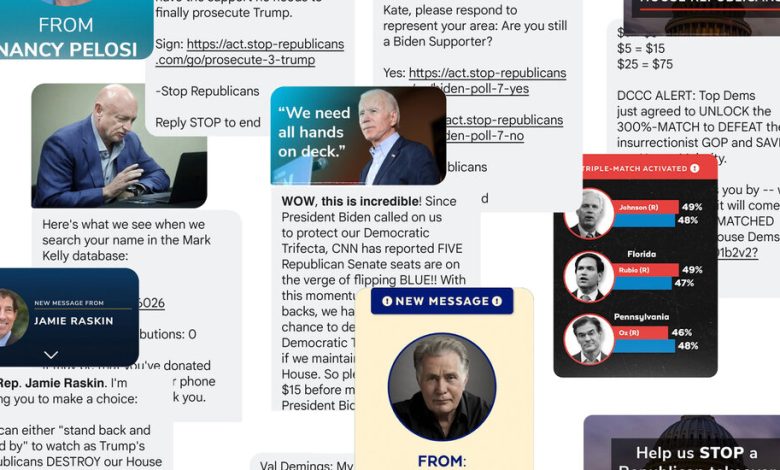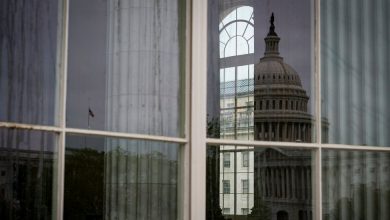Fed Up With Political Texts? You’re Not Alone.


Democratic campaign messages sent in the name of President Biden and Speaker Nancy Pelosi featured prominently in texts submitted by readers. Many complained that they had difficulty opting out.Credit…Zak Bikel/The New York Times
Like voters around the country, people in California were inundated with political text messages during the midterm election campaign. In October alone, Californians received a whopping 163.9 million of the messages, according to estimates from RoboKiller, an app that blocks robocalls and spam texts.
Many Californians found the electioneering texts annoying, polarizing, occasionally dubious and definitely intrusive. Among those who felt that way was Amber Stoffel, the manager of a community science program in Huntington Beach, who received a barrage of unsolicited texts from local and congressional candidates across the political spectrum.
“Hi Amber, this is Heather, a volunteer with Katie Porter for Congress!” said one message promoting the re-election campaign of Porter, a two-term Democrat.
Another message sent to Stoffel, this time disparaging Porter, came from the Congressional Leadership Fund, a Republican political action committee.
Stoffel told me she was registered without a party preference. “I guess that makes me free game for everybody,” she said of the flood of political text messages. “To be honest, it feels like spam.”
Unlike most other states, California has a law specifically intended to make political texts more transparent and less spamlike. The state has long been a pioneer in U.S. tech regulation. Yet, as Stoffel’s experience suggests, the narrow rules may have limited effectiveness.
I’m a tech reporter at The New York Times and I starting looking into the boom in political texting this fall. I wanted to learn more about the campaign messages, partly because, unlike political ads on broadcast TV or radio, texting uses a private channel that is not subject to public scrutiny.
Another big difference: Unlike broadcast TV and radio ads, mass campaign texts do not have to adhere to federal rules requiring political ads to say who paid for them.
To help with the reporting, more than 960 readers, including more than 100 in California, answered questions from The Times about their experiences. People also sent in more than 1,000 images of the political texts they received.
More on California
- Jaywalking Law: California has had one of the strictest jaywalking laws in the nation. Starting Jan. 1, that will no longer be the case.
- Remaking a River: Taming the Los Angeles River helped Los Angeles emerge as a global megalopolis, but it also left a gaping scar across the territory. Imagining the river’s future poses new challenges.
- A Piece of Black History Destroyed: Lincoln Heights — a historically Black community in a predominantly white, rural county in Northern California — endured for decades. Then came the Mill fire.
- Employee Strike: In one of the nation’s biggest strikes in recent years, teaching assistants, researchers and other workers across the University of California system walked off the job to demand higher pay.
In 2019, California became the first state to pass a measure requiring a “paid for by” disclosure in mass political texting. Called the Text Message Disclose Act, the law requires candidates, party committees and independent expenditure groups sending bulk text messages that support or oppose a political candidate or a ballot measure to state who paid for them.
Given California’s rules, I was curious to see whether electioneering texts sent to Californians provided more details about their sponsors than similar messages sent to voters in other states. Examples sent in by readers suggest that at least some do.
One text assailing Proposition 30, a state ballot measure that would have increased taxes to help promote electric vehicles, for instance, clearly stated that it was paid for by “No on 30,” a ballot committee. It also noted that the group’s “top funders” included Reed Hastings, the chief executive of Netflix.
Some messages promoting local California candidates were also transparent, but others lacked the required disclosures. Candidates or groups that fail to disclose who paid for political texting campaigns may receive warning letters or face fines from California’s




